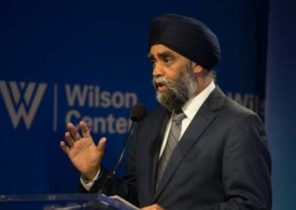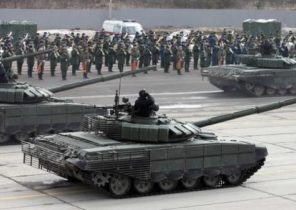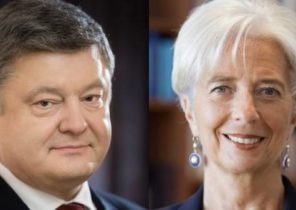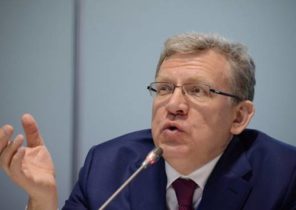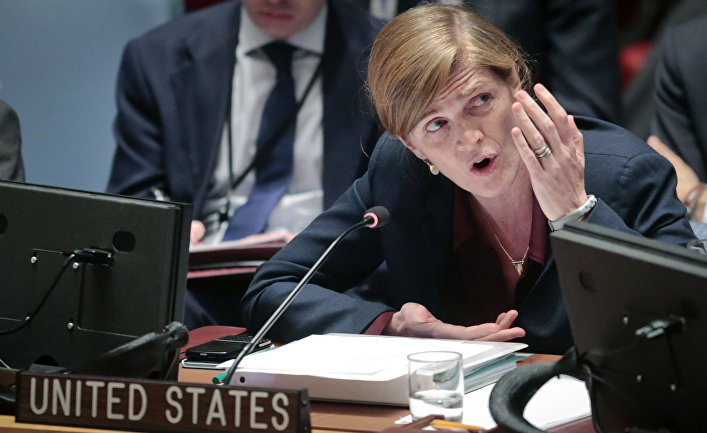
The US representative to the UN Samantha Power on Tuesday made a farewell speech at the Atlantic Council. There she did not stop to simple and easy subjects, and without any beating about the Bush spoke about “a major threat to our great nation” — about Russia.
In the last months of Power without hesitation makes sharp comments about Russia. Commenting on the tragedy in Aleppo in December, she said, “I say to the Assad regime, Russia and Iran — members of the UN behind the capture and mass slaughter in Aleppo: you are responsible for these atrocities… don’t you have any shame? Do you have nothing to shame? Are you not concerned about any barbaric acts against civilians, no killing of children?”
On Tuesday she reiterated Syria and on Russia’s attempts “to interfere in our presidential elections to undermine the confidence in the American democratic process.”
Here is the full text of her speech.
Thank you. I had the privilege to work in the Obama administration for the past eight years. First in the White house, and the last three and a half years as the U.S. representative to the United Nations. I have never had such an important and meaningful work. And here I remained only three days.
This is my last major speech as a member of the current administration. And although I would like to take this opportunity to appeal to other people to go into public service and to bring pragmatic arguments in favor of strengthening the UN, I feel like circumstances are forcing me to focus on the more important topic on the main threat to our great nation — Russia.
Before turning to the substance of the issue and tell about the threats posed by Russia, I want to emphasize that the greatest satisfaction at my post in the UN I felt when I was able to work with my Russian counterpart. In 2013, we jointly arrived at a decision on the removal of Syria’s most dangerous chemical weapons. Russia played a key role in imposing sanctions against Iran for its illegal nuclear program. These sanctions were extremely important in order to bring Tehran to the negotiating table, and therefore we are able to work out an agreement cut off Iran all the way to the creation of the atomic bomb. Russia also worked constructively with the other members of the Security Council in selecting the best candidates for the post of UN Secretary-General, with the result that he was elected leader with vast experience and vision.
People often turn to the cold war as a paradigm to understand the nature of Russian-American relations. But the reality is that in the most important moments of our common history in the interests of the United States and Russia often coincide. We fought together in two world wars of the 20th century. I must say that if not for the enormous sacrifices of the Soviet Union during the Second world war, when he lost more than 20 million people, that is many times greater than any other nation from among friends and enemies, the war would have lasted much longer, it would have killed millions of Americans and people from other allied powers, and fascism it is able to prevail in many countries of the world. And that’s not saying that developed after the Second world war, the order would hardly be able to build. The huge contribution of Russia in the war is part of its proud history of opposition to the imperialist powers, from the Mongols in the 16th century to Napoleon in the 19th. in addition, many of the problems which Russia faces today — and that extremist violence, territorial expansion of China, the national industry and jobs, which expires at globalization — exist in the United States. It is in our interest to solve problems jointly with Russia. The dialogue between us is an urgent imperative.
While those who watched my debate in the Security Council with Russia, knows that I and my government have many serious concerns about the aggressive and destabilizing actions of Russia. The arguments that I want to give today, go beyond the concrete actions of Russia in implementation of its strategies and their implications for U.S. security.
Today I will tell about how the Russian government under President Putin has been taking steps to weaken the legal order, the fruits of which we have enjoyed for 70 years. With this procedure linked to our values, our security and even our way of life. And we (and by “we” I mean the United States and our closest partners) are obliged to make concerted efforts to prevent Russia to achieve success.
This means that we need to better understand how Russia disputed this order, to conduct explanatory work about it in our society. This means that we must renew our devotion to the rules and institutions underlying this order, and to develop new means of countering Russian tactic to derail. This means that we need to address the shortcomings in our democracy, revealed and intensified during the Russian attacks. We can’t allow Russia we split. If we jointly oppose this threat, we will be able to adapt and strengthen the order, which is based on our interests.
Terms such as “international order” may seem an abstraction, and therefore let me specifically to what the essence of threat from Russia’s actions. The order enshrined in the UN Charter and other important international agreements after the Second world war, was built on the understanding that the security of all our countries will be achieved when we stick to a certain set of rules. One of those rules is that the borders between sovereign States are inviolable. The other is that even during the war it is impossible to apply certain types of weapons and tactics. And yet, while public administration can exist in different forms, which differ from country to country, some human rights are an integral necessity for the containment of state power. And that violating these rules of the country must be held accountable.
We know that over the seven decades since the creation of this order, much has changed. When we created the United Nations, it consisted of only 51 member countries. Now they are much more — 193. At that time, some great powers of today was not even independent States, but many of the existing countries do not have sufficient weight and equal voice in the development of these rules. In addition, some existing threats such as violent terrorist groups and cyber attacks, would have been unthinkable to the architects of this system. There are many reasons conceived in 1945 and based on the rules of procedure is not well suited for the challenges we as a global community face in 2017. It is reasonable to suggest that we need to bring these rules in line with the time to sit down at the negotiating table more participants, have the right to vote, having in mind that with some of them we won’t agree. But this system can evolve, and the vast majority of countries recognize that we all benefit from the existence of rules that constrain certain actions and enhance our collective security rules that cannot be rewritten by force.
I must admit that sometimes other countries may find offensive and aggressive actions that the United States is taking to protect own security and the security of the allies. We should fully be aware of this and therefore this is an important dialogue. Someone might not without grounds to claim that our government does not always act according to the rules we are talking about. As stated by President Obama, on assuming their duties, the United States seeks to be a leader by example, but sometimes they do not succeed. However, under the leadership of President Obama, we have demonstrated a commitment to strengthening and observance of the rules-based international order, which is not to say today about the Russian state.
For several years we have seen how Russia is making one aggressive and destabilizing for others.
We saw this in March 2014, shortly after the massive protests to power in Ukraine came the government, advocating for closer ties with Europe. Then Russia sent its soldiers on the Ukrainian Crimean Peninsula. “Little green men” as they were called due to the fact that Russia denied their connection with them, at gunpoint held a referendum, and Putin used his results as a justification for the fraudulent annexation of Crimea.
We saw it a few months later in the East of Ukraine, where Russia armed and trained the separatists, and fought on their side. Again, Moscow has denied any involvement in the conflict inspired by her, again violating its international obligation to respect the territorial integrity of neighbouring countries.
We saw it in the way Russia supports Bashar al-Assad in his brutal war in Syria. She continues to support him, despite the fact that the Assad regime is blocking delivery of food and medicine to the civilian population in opposition-held areas. These people were in such a desperate situation that they were forced to eat leaves. There were photos of the many prisoners that are in the dungeons of the Assad tortured to death, and the bodies attached tags with serial numbers. But the Assad regime has repeatedly used chemical weapons, killing their own people.
We saw it in 2015, when Russia went even further, joining the offensive against the Syrian people and sending troops and aircraft, which struck at hospitals, schools and the brave Syrian rescue workers trying to dig in the ruins of innocent civilians. Every case these atrocities were killed, injured, starved, left their homes all the new civilians. Along with this flouted rules that ensure the safety of our countries, including Russia itself.
We saw it in Russia’s attempts to undermine the authority of international organizations such as the UN. For example, Secretary-General ban Ki-moon at a special UN security Council meeting last month told the members that the troops of Assad and Iranian mercenaries kidnap people, seizing neighborhoods in Eastern Aleppo. In response, the representative of Russia, which covered this attack from the air, said that the Russian investigative action not set”, not a single fact of ill-treatment of civilians in East Aleppo and violations of international humanitarian law” and accused the Secretary-General that it draws information in fabricated materials. A few minutes later the Russian point of view was repeated by the Syrian representative that submitted as evidence a photo of government soldiers, ostensibly to help the elderly woman. The only problem is that this picture was taken six months earlier, in June 2016. And in the Iraqi city of Fallujah.
At the same time, we have seen how Russia is systematically trying to sow doubt in democratic countries and to drive a wedge between US and our closest allies. To this end, it supports anti-liberal parties such as national front in France, whose xenophobic and anti-Muslim program. When this front was having financial problems during the election campaign of 2014, a Russian Bank with ties to the Kremlin gave him a loan of 11 million dollars. This may seem a small amount compared to what spend the American party during its campaigns, but is about one-third of the amount that the national front intended to collect. And in that election, he achieved considerable success. It is not surprising that the leader of the front is constantly trying to justify Russia’s seizure of Crimea.
Russia with the help of hacker attacks have tried to sow distrust of the democratic processes of our closest allies, and to harm the policies of their governments. Here is an example from Germany. According to the German secret services associated with the Russian government of the organization in may of 2015 carried out a massive cyber attack on German Parliament, energy and telecommunications companies, and even universities. And last month, the German intelligence service reported an alarming surge “aggressive and more active cyber-espionage and cyber operations that could endanger the leaders of the German government, members of Parliament and employees of the democratic party”. These actions of the German secret services has attributed to Russian hackers. The head of the foreign intelligence service of Germany reported that the target hackers were “delegitimizing the democratic process.”
In other cases, Russia has directly intervened in the activities of democratically elected governments. At the end of last year, the leadership of Montenegro announced the opening of plotting violent disruption of national elections, the overthrow of the government, the drive to power loyal to the Moscow administration, and perhaps even to assassinate the Prime Minister. Prime Minister of Montenegro insisted on joining NATO, and Russia openly opposed such a step. The plotters admitted to investigators that they were being funded and equipped by the Russian representatives also helped plan the coup.
It is in this context that we must examine the recent actions of the Russian state to undermine American democracy.
As found out the US intelligence community, Russian authorities tried to interfere in our presidential elections, to undermine confidence in the American democratic process, to denigrate one candidate and help another. According to our intelligence services, the campaign ordered by President Putin, and was carried out by Russian government agencies, public media, intermediaries from third parties and paid government trolls. We know that in addition to hacker attacks on the national Democratic Committee and party leaders, Russia has also hacked the computers of us think tanks and lobbying organizations. We also know that Russia has carried out numerous computer break-ins in the electoral commissions of the States and counties, although the assessment of our intelligence agencies, it did not affect the voting results. But think for a moment about what all this means: Russia has not only tried to influence our elections, but also tried to access our systems for voting.
At first glance, between all these Russian attempts to interfere in different regions of the world there is no relationship. However, this is because a common thread running through all these operations, it is impossible to find is that struggling Russia. It can be found only against what it stands for. Not in the rules that it observes and those it violates. Russia with its actions is not opposed to the new world order. It destroys the existing order. And against that we are fighting. After defeating the forces of fascism and communism, today we’re fighting the forces of authoritarianism and nihilism.
There are many theories about why the Russian government weakens the system in whose creation it had played a crucial role, and which provided unprecedented advances in human freedom and development. Perhaps this is done in order to distract the Russian people from the widespread corruption, which takes a huge portion of the national wealth generated by Russian oil and gas, and undermines the income of ordinary citizens. Perhaps this is done in order to revive the feeling was of glory, or strike at the countries, which Moscow blames the collapse of the Soviet Union, after President Putin called it “the greatest geopolitical catastrophe of the 20th century.”
Today I’m not going to speculate about the motivations behind the actions of the Russian state, threatening not only our democracy, but to all the order on which rests our security and well-being. I want to ask the question: what should be done to eliminate this threat?
First, we on a bipartisan basis should determine the extent to which and the extent to which Russia interfered in the recent presidential election. We must identify the vulnerability of our democratic system and offer concrete recommendations to prevent future attacks. Initiated last week, congressional hearings, bipartisan investigation, which, on 13 January announced the Senate select Committee on intelligence, joint analytical report on malicious cyberactivity of Russia, prepared at the request of President Obama’s joint intelligence report — these are all important steps to achieve these critical goals.
The goal is not to challenge the results of the recent elections. The goal is to identify gaps in our defense that used Moscow as well as other weaknesses, which it in the course of this attack did not use but may use in the future. And we need to determine the appropriate action to close these gaps and strengthen the resilience of our system. It would be very naive and even foolish to think that the people that discover vulnerabilities in our system, will not try to use them again and again. It is not only about Russia, but about all those States and non-state forces, who see the weakening of our democracy the possibility to defend their interests. This has happened repeatedly. As we all know, hacker attacks took place in the presidential elections in 2008 and 2012.
It is imperative that these actions were taken on a bipartisan basis. If you let politics prevent the detection of full extent of Russian intervention and protection of our democracy, it will undermine our core national security interests. It is good and constructive, when our party to discuss the question of how to increase the size of the middle class, and what role our country should play in the world. Worse, when the party and its leaders are questioning the unanimous, well-documented assessment of our intelligence community, indicating that foreign country are trying to harm our country.
Second, we need to better inform our citizens about how serious the threat from the Russian state. Here our unity is also extremely important. When we are applying conflicting signals about threats from Russia, it brings confusion in the minds of the American people. A recent survey showed that 37% of Republicans have a positive attitude to President Putin. In July 2014, the figure was only 10%. This alarmingly high figures for the leader, on whose orders the killing of journalists, human rights activists and opposition politicians, who mocks our Constitution, and trying to influence our elections. I know some say that this obsession with Russia due to the loss of the Democratic party in the recent presidential elections, which today is considered a “complete loser.” But every American should be alarmed that foreign interference in our democratic process. It is not the leader whom we choose and who chooses that leader. Such a privilege should be accorded only to Americans.
We also need to decisively reject a false equal sign between the work of the American and Russian governments have in other countries. There is a sea of difference between supporting free and fair elections, independent institutions defending human rights, accountability and transparency in government, what we do, and attempts to sow distrust of the democratic process, to mislead citizens and to help in the election of illiberal parties what the Russia.
Thirdly, we should assure our allies that they can count on our help, and make sure that Russia paid for violation of the rules.
This means that we must continue to cooperate actively with NATO, clearly demonstrating the continued commitment of the US to consider an attack on any member of the unit as an attack on the entire Alliance. We hope that all our NATO allies will contribute to strengthening the Alliance, and to fulfill undertaken in 2014 the obligation to spend at least two percent of GDP on defense. We in the Obama administration constantly wanted NATO members meet this commitment. We also need to strengthen cooperation and exchange of information to detect, deter and protect against new hacker attacks and threats, especially due to the fact that this year France, Germany and the Netherlands will hold a national election.
In addition, we must maintain the sanctions against Russia, including those President Obama imposed in response to Russian intervention in the American elections. Some argue that the most effective way to force Russia to play by the rules underpinning international order is to ease sanctions. If we only lower the pressure, they say, Russia will stop their attacks on the international order. But they all put on the head. If you weaken punitive measures against the Russian state, which does not want to be corrected, it will give him courage, sent the signal that the waiting is the best way to achieve international recognition of their actions. This will not only encourage Russia to more dangerous actions, but will also inspire other violators, such as Iran and North Korea, which constantly put us to the test by checking how far they can go without causing a reaction.
An equally erroneous argument that the United States should forget about the latest violations of Russia and start a new “reset”. Yes, the Obama administration tried to do in his first term. But 2017 is not the year 2009. in 2009 the President of Russia was Dmitry Medvedev, and we could find a mutual understanding in such matters as combating terrorism, arms control and war in Afghanistan. More importantly, in 2009 Russia has occupied the Crimea, stoked conflict in Eastern Ukraine, was not bombed hospitals and emergency services in Syria. And most importantly, it did not intervene directly in American elections.
But it would be a mistake to think that to protect America and our allies from the Russian threat is enough for us to use the old capabilities. That is, if we shut the holes in our defense, inform the public, save and even toughen sanctions and reinforce NATO, we will be able to protect the rules-based order. The fact is that Russia has one important advantage. To destroy the institutions is easier than to build. It is easier to sow doubt than to gain the trust of the people. Easier to cook stuffing information than to report the real facts in the news. Simply put, in 2017 in international Affairs is much easier to be bad than good.
Here’s one example. 19 Sep 2016 air strike in the Syrian town of Urum al-Kubra has been the humanitarian convoy of the Arab red Crescent. Killed at least 10 civilians and 18 trucks with food and medicine for desperate Syrian population was destroyed. As the blows were inflicted in a region where flies only Assad aircraft and its Russian allies, have heard the reports that most likely, the attack was carried out by regime forces or Russian. But instead of taking responsibility for what happened and figure out what happened, the Russian authorities did what they always do when you are involved in cruel crimes: they began to deny everything and lie.
Initially, the Russian defense Ministry said that Russian and Syrian planes did not cause any attacks in the area, and that according to expert analysis of the video, the convoy was destroyed by ground fire. Then the press-Secretary of President Putin said that the terrorists were near the rocket fire, hinting that they attacked the convoy. Then the Russian said that several minutes before the strike in the skies above the column were seen American drone. This was contrary to their initial statement that the attack on the convoy was struck from the ground. Three stories in two days. And all the false.
But Moscow is ready to lie even such reputable publications and stations as the New York Times, BBC and CNN began to report the incident from different angles. A Russian state TV channels of RT played a very important role in this light, quickly spreading lies and questioning witnesses. As once said one editor RT, “our lack of foreign broadcasting is equivalent to the absence of the country’s Ministry of defence. When there is no war, it seems that we don’t need it. But when the war starts, it takes on critical importance.” In other words, a lie is a strategic weapon. No matter whether Russian message of reality, and consistent. What is important is that Russia is included in the news cycle a sufficient number of counter-claims, in order to sow doubt about who is responsible. By the time when the UN after three months published a report about this incident, having concluded that the convoy suffered an air strike, which could only be exercised by the Assad regime or Russia, information on concealment of a crime by Moscow has not attracted much attention. Denial and lies.
Sometimes there is a feeling that outwit the enemy, which is rampant lies, only in the case that the story of his own game. It is a profound mistake. If we try to meet with the Russian government in his field, where everything is upside down, where left is right and black is white, we will help him to achieve his goals is to create a world where truth is relative, and where the lost faith in the integrity of our democratic system.
We have no need to expand the system of propaganda, to Finance your own army of Internet trolls to flood the social network with fake news aimed at our opponents. We need to fight misinformation through information. With the invention of facts. But to establish and disseminate facts, as well as for the manufacture of a stuffing information, the right resources. The report of the British Parliament stated that the Russian government is spending between 600 million to one billion dollars a year on propaganda channels like RT. So we need to spend at least as much, and perhaps much more on the training and equipping of independent reporters on the protection of journalists under attack, and finding ways to bypass censorship and firewalls used by repressive States to deprive their citizens of access to critical information.
Here I come to the fourth and final method of countering the threat that Russia poses to the international legal order. We must continue to seek ways and means of direct communication with the Russian people and — from what I began today — with the government.
It’s easy to forget that virtually all the tactics used by the Russian government to undermine democracy abroad, worked on the Russian people, and very effective. When the Russian soldiers killed in the conflict in the East of Ukraine, and their government denies any involvement, the Russian mothers, widows and orphans are deprived of benefits and recognition they deserve as members of the families of the dead soldiers. Most Russians profit from the mafia, with which the Russian government spreads corruption abroad. As for exposing crimes of the state are persecuted, beaten and even killed Russian journalists and human rights defenders.
Therefore, we must carefully draw a line between the Russian government and the Russian people. We can’t let the relations between the U.S. and countries with 140 million people, which has made a significant contribution to world civilization, has a rich history and culture, and which we heartily wish them prosperity, determined solely by a vile clique, are an insignificant part of the state. However, today our contacts with ordinary Russians reduced to a minimum. It is no coincidence that the Russian government in recent years closed 28 funded by the government of the United States “American corners” in which he worked free library, language courses for Russian citizens conducted cultural events. It closed the American center in Moscow, which was attended by over 50 thousand Russians a year. It also expelled from the country backed by the U.S. government and independent, non-profit organizations such as the national endowment for democracy (National Endowment for Democracy) and the Foundation “open society” (Open Society Foundation), which for decades has facilitated the formation of civil society and legal state in Russia. As the Kremlin closes these organizations, depriving them of access to the Russian people, we must seek others to replace them.
We also cannot refuse from contacts with the Russian government. We have to do it, partly due to the fact that the cooperation on issues of mutual interest, will allow us to not only tell, but show the truth as we know it — that our country will benefit greatly if they work on the creation of a system of General rules and principles, and not on its dismantling. Working together, we will be able to recreate the respect and trust that are necessary to combat the unprecedented global threats of our time, threats which could not be overcome without our mutual assistance.
Let me make a conclusion. In 1796, the first President of our country George Washington in his farewell address to the nation warned the American people about the dangers of the interference of foreign States in our democracy. He told his listeners: “a Free people ought to be constantly on alert because of the danger above the insidious foreign influence (I conjure you to believe me, fellow citizens), because history and experience shows that foreign influence is one of the worst enemies of Republican government.”
Since then has passed more than 220 years, and the warnings of Washington still sound very relevant. The fact is that the problems that came to Washington in the “intrigues of internal factions, the art of seduction, deception of public opinion, the influence and intimidation of the public councils” with the advent of modern technology has only multiplied. And unlike 1796, to us today it’s not enough to protect our democracy from foreign intervention. We must also protect the integrity and safety of all rule-based international order, the Foundation on which rests our security and well-being.
Yes, a lot has changed since then as Washington delivered his warning, but the threat remains the same. We are talking about the creation of America — a country born from a simple but revolutionary idea: that the right to determine the path of development of our country belongs to the American people, the ordinary citizens, not the state, or its foreign. This right we had to defend throughout American history. In recent decades Americans have had the confidence that no one dares to deprive them of this right, however, reminded us that such attempts will continue.
The nature of the threat have not changed since the days of Washington and the most effective ways to combat it. We must revive the faith of the American people in our democracy. The vitality of American democracy has long been defined by the ability to keep the faith of our citizens that the power of the people is the best way to ensure the safety of yourself and your loved ones, to preserve the most valuable for our freedom and expand our capabilities. We are not a perfect system, but it can improve, because the American people always has the capacity to improve, update, and creation. This belief became the driving force that drives our Republic since its inception, and for this reason, other countries still see America as a role model.
That’s the faith that set out to undermine the Russian government for its intervention. The Kremlin’s goal is to convince our people that the system is rigged, that all the facts relative to that common people trying to improve their society and country, wasting my time. Instead of faith it offers cynicism. Active participation instead of indifference.
But the truth is that attempts of the Russian state to sow doubt in the integrity of our democracy would not be so effective if many Americans did not share such doubts. Those Americans who are asking whether our system is as before to solve everyday problems that they face and gives them a society of reason to hope that they can change lives for the better. Thus, these attacks have shed light on reinforcing a sense of fragmentation, mistrust and frustration.
But we know not only what you’re up against, but what are you fighting for. We clearly understand the nature of the threats posed by Russia from the outside, and we are United in opposition to them. But we must also devote himself to the revival of the faith of our citizens in our democracy from the inside — after all, this faith has always been the best protection from any foreign power trying to harm us.
Thank you.

